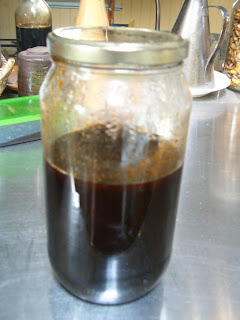


|
Joined:
|
30/01/2011 |
|---|---|
|
Last Updated:
|
30/01/2011 |
|
Location:
|
Kin Kin, Queensland, Australia |
|
Climate Zone:
|
Sub tropical |
|
Gender:
|
Male |
|
Web site:
|
permaculturesunshinecoast.org |
(projects i'm involved in)
(projects i'm following)
Posted by Tom Kendall almost 13 years ago
"Yacon syrup is a sugar substitute native to the Andean region of South America. It is glucose-free, and does not increase blood sugar levels. Because of this, yacon syrup is often recommended as a sweetener to those suffering from diabetes or at risk of becoming diabetic.
The syrup is derived from the roots of the yacon plant, and according to some studies is a good source of antioxidants. The yacon plant tastes similar to jicama, but is biologically closer to the sunflower family. The component that gives the roots a sweet taste is Fructooligosaccharide, or FOS. The tuberous roots may be made of nearly 50% FOS, and are believed to be the greatest producers of the saccharide in the natural world.
Because the body cannot process FOS, it passes through the system without leaving behind absorbable sugar compounds. It also is relatively low in calories, compared to most other sweeteners. " - Source: www.wisegeek.com
We had an over-abundant supply of yacon that had to be harvested. Yacon (also known as ground apple) grows very easy in our (sub-tropical) climate, one plant produces many rizomes for division and re-planting. It needs very little attention when in the ground and Tom is of the opinion that it improves the soil where it has grown.
One can only eat so much yacon and we do not like wasting resources, and after visiting a health shop and noticing the latest health craze is yacon syrup, I decided to try and make some.
I researched a bit on the internet and found that yacon syrup is a healthy sweetener, just what the doctor ordered for us. So if I could get this yacon syrup to work, it would mean we would no longer need to buy any sweeteners, be one step closer to self reliance and receive health benefits.
So I started by digging up a patch of yacon and washing it. To wash it, I put it in a crate and set the hose on it with a fair bit of pressure. I ended up with about 2/3 of a crate of yacon.
I peeled 2 big bowls full of yacon with a potato peeler (about 2/3 of the amount I had). Then I juiced the peeled yacon and poured the juice into a big pot (around 4 1/2 Litres of juice). The pulp ended up with the chooks and the geese.
The pot is on the stove and as you can see some scum is already floating on the top. I kept skimming the scum off the top and once it started to reduce I skimmed it from the sides of the pot as well.
I brought the pot to the boil and then let it simmer. I started in the afternoon and let it sit on our wood stove overnight. In the morning I brought it to the boil again and skimmed off more scum from the sides and top. By this time the juice had reduced to about 800ml. The juice had become very dark and the smell was a delicious molasses or treacle smell.
I took the pot off the stove and filtered the juice through a fine metal mesh. Any thicker material staying behind I put in a separate container (for use as well, just to experiment with it. It can be added to dishes that require cooking as a sweetener).
Finally I ended up with a jar with 750ml of yacon syrup. It has a beautiful, sweet treacle like flavour. I keep it in the fridge, but I don't think you need to. We add it to drinks, desserts and just use it as a general sweetener. This abundant resource in our garden is allowing us to enjoy healthy sweets and we no longer need to buy other sweeteners. As a comparison, the jar of yacon syrup in the health shop was around 200ml for $24... And it was most likely imported from South America.
Tom is now looking at possible other uses for this resource, eg adding it to animal fodder or making it into a fuel, if he can get to it before I do.

My jar of Yacon Syrup
You must be logged in to comment.



| Permaculture Design Course |
| Type: Permaculture Design Certificate (PDC) course |
| Verifying teacher: Geoff Lawton |
| Other Teachers: Bill Mollison |
| Location: Melbourne |
| Date: Sep 2008 |

| Permaculture Design Teacher Training Course |
| Type: Teacher Training |
| Teacher: Geoff Lawton |
| Location: Zaytuna |
| Date: Mar 2010 |
| 5 PDC Graduates (list) |
| 20 PRI PDC Graduates (list) |
| 17 Other Course Graduates (list) |
| have acknowledged being taught by Tom Kendall |
| 0 have not yet been verified (list) |
| Tom Kendall has permaculture experience in: |
|---|
| Warm Temperate |
| Island |
| Sub tropical |
| Wet/Dry Tropical |